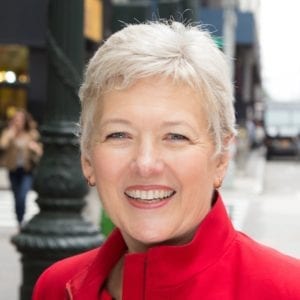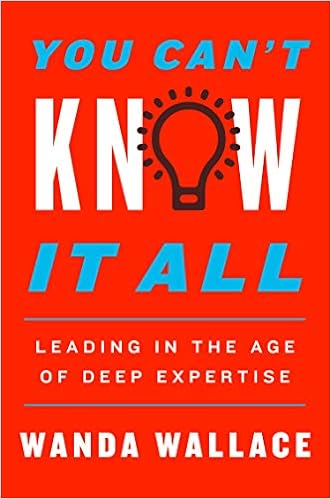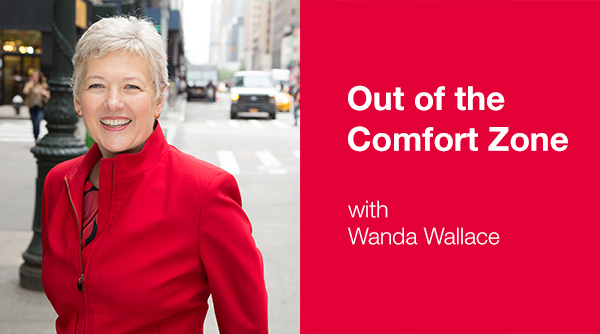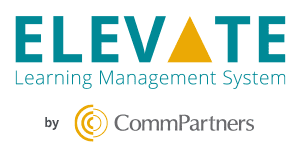
Dr. Wanda Wallace, Managing Partner of Leadership Forum, LLC, is committed to changing the world by helping people improve the quality of their conversations. As a globally recognized leadership expert, the Out of the Comfort Zone radio show host coaches leaders, conducts seminars and works with teams to improve their leadership capability.
In recent years, much of her work has focused on helping women “get to the top, stick, and thrive” and—as an extension of that work—the potential trap for both women and men who are perceived as “expert” leaders, a topic she explores in her book, You Can’t Know It All: Leading in an Age of Deep Expertise.
In this episode of the Leading Learning Podcast, Jeff talks with Wanda about the qualities of great leaders including the importance of quality conversations and the necessary mindset to be an effective leader. They also discuss her work related to women in leadership and what it means to be an expert leader versus a spanning leader.
To tune in, just click below. To make sure you catch all of the future episodes, be sure to subscribe by RSS, Apple Podcasts, Spotify, Stitcher Radio, iHeartRadio, PodBean, or any podcatcher service you may use (e.g., Overcast). And, if you like the podcast, be sure to give it a tweet!
Listen to the Show
Read the Show Notes
Leading Learning Resources
[00:18] – Before getting to the interview, we have a couple of resources to highlight that we believe Leading Learning listeners will find valuable:
 Informal learning business curriculum – We recently curated and categorized a number of the episodes that we have done together over the years that focus on the domains that fall within the Tagoras Learning Business Maturity Model.
Informal learning business curriculum – We recently curated and categorized a number of the episodes that we have done together over the years that focus on the domains that fall within the Tagoras Learning Business Maturity Model.
Collectively, these episodes represent a great way to build or improve your knowledge in essential areas of the work that we do as learning business professionals and leaders. You can go through these episodes on your own or go through them collaboratively with others in your organization.
- Leading Learning newsletter – As a subscriber to the newsletter, you’ll get a digest of all the podcast episodes published each month. You’ll also get our monthly Leading Links e-mail in which we curate links to resources that we’ve identified as valuable to learning business professionals. And, finally, you’ll get notified whenever we offer free Leading Learning Webinars or other events.
[02:04] – A preview of what will be covered in this episode where Jeff interviews Dr. Wanda Wallace.
Reflection Questions

[01:10] – You might consider the reflections questions below on your own after listening to an episode, and/or you might pull the team together, using part or all of the podcast episode for a group discussion.
- As we’ve already referenced, improving the quality of conversations is a big part of Wanda’s focus, and it’s a topic we explore in some depth in the interview. So pay close attention to that part of our conversation, and think about some of the important conversations that have happened recently in your organization. How were they or were they not high-quality?
- At the core of Wanda’s recent book is the concept of the “spanning leader,” so listen to our discussion about that concept and ask yourself, to what extent is my value in being an expert and to what extent am I helping to enable others and create value through being a spanner? Do I need to shift that balance in any way?
Committed to Changing the World
[05:28] – Introduction to Wanda and some additional information about her work and motivation for being focused on leadership.
Wanda starts by saying she’s absolutely committed to changing the world, which is her mission, purpose, and reason for being. She often jokes she may have to do that one person at a time and that’s a slow journey, but that’s ok.
If you think about what adds the biggest stress to our work lives, it really comes down to the people we interact with that we don’t get, don’t understand, don’t get along with or don’t know how to talk to. If you could change the quality of the conversations that happen among people that are just not seeing eye-to-eye, we could begin to solve some phenomenal problems and take a lot of stress out.
So Wanda’s passion about changing the world is really about changing the way we talk to each other, communicate, and interact. And this is the focus of her work.
Great Leadership and Conversations
[07:39] – From your perspective, when you see great leadership, does that mean great conversations are going on? What are the qualities of great leadership for you?
Wanda shares that every time she works with a group (thousands of people in any given year), she asks them to name somebody in their organization that they really know and admire as a leader and then to list those qualities. For 25 years she says these qualities haven’t deviated—somebody who makes decisions, cares about them, who can coach them and give good feedback, trusts and respects them, who walks the talk, opens their network and helps them, etc. And Wanda points out that all of these things are conversations.
If you look at trust, she says trust is a judgment—I decide to trust you and I’m going to decide to trust you based on what you’ve said to me—what you’ve done, but what you’ve said. So it’s still a conversation at the end of the day.
[09:30] – Obviously, you’re somebody who believes this can be learned—and by extension, can be taught. How do you go about learning this and taking stock in yourself or helping others take stock so you’re helping to facilitate or teach this concept of better conversations and helping people become better leaders?
Wanda relates this to having a learning mindset and says that openness to believe you don’t have all the answers in the world or the only perspective and that somebody else might have an angle that would really matter.
When she looks at leaders that many people in the organization admire, what’s phenomenal about them is their unrelenting pursuit to keep getting better, finding that small subtle shift to do differently to get more people on board; and constantly looking for that because they’re looking to refine their edge. They also have a willingness to reflect and therefore the self-confidence in doing that is all really important.
The second quality of great leaders Wanda observes is getting the balance. For example, communication—you can overdo that as much as you can underdo it. So for every quality that you have, she looks to see that you aren’t overdoing or underdoing it.
So what you’re looking to do when you want to help people become better leaders is to help them take a look at their balance. Not that what they’re doing is right or wrong but how’s it coming across and how’s it being received. If you shifted your weight just a tiny bit from one side to the other side, would you get a better impact?
Fortunately, Wanda says it relatively easy to help people see whether their balance is in place or not. Then the question for making real change is getting people focused on one or two of those issues and consistently changing what they do. Then noting how it has an impact and seeing success out of that, which reinforces it/makes it a habit.
Wanda adds that every great leader she knows didn’t come into the world great—it’s an acquired and lifelong skill and she doesn’t think you every really get great at it.
Sponsor: CommPartners
[13:01] – If you want a partner to help with building lifelong skills for the learners and leaders you serve, be sure to check out our sponsor.
CommPartners helps learning businesses conceive, develop, and fulfill their online education strategy. Their solutions begin with Elevate LMS, an award-winning learning platform that provides a central knowledge community and drives learner engagement. To extend the value of Elevate, CommPartners provides a wide range of online education services including curriculum design, instructional design, fully managed Webinars, Webcasts, livestream programs, and virtual conferences.
[13:48] – I may be biased but I hear the connection in this to learning—that you have to continually recognize the need for learning and be committed to learning if you’re going to develop as a leader. What are your thoughts about that?
Wanda says without a doubt, as you look around the world in any organization (profit or non-profit), being able to be more collaborative tends to generate better results if you can do it well. But the cornerstone of collaboration is when you’re willing to stop what you’re thinking and be open to the alternative that there might be another perspective. Until you’re willing to do that, there will be no collaboration that happens.
Since you don’t want to give up your ideas either, it goes back to that notion of balance. And Wanda thinks heart and soul is this openness to explore.
Expert Leader vs. Spanning Leader

15:03 – In your recent book, You Can’t Know It All: Leading in the Age of Deep Expertise, the core concept is you have this idea of an expert leader and now the need to be what you call a spanning leader. Can you talk a little more about that concept of the expert leader and how you’re contrasting it with the spanning leader in your book
Wanda jokingly admits she may offend other leadership experts but that she personally believes that the notion of developing a general manager – someone who could lead absolutely anything – is missing the mark today. She points out we are a knowledge driven economy so businesses are driven desperately needing people who have deep expertise in very specific things (IT experts, finance experts, engineer experts, etc.).
So rather than coming into a company thinking that you’re going to become a general manager, what most people end up doing is becoming an expert leader. It gives them credibility, people trust them because of their expertise, and are willing to follow them because they know more. This sets up everything we begin to do in organizations in leadership roles. And Wanda notes this isn’t just at the junior level—this can go all the way to the C-suite.
When something goes wrong, the expert leaders are the ones who are going to step in and more often than not, figure out what happened and what to do about it. So expert leadership is a good thing and it’s here to stay but it sets up a particular style of leadership, where conversations are going to be more about facts, content, and what they know.
Wanda acknowledges that you want some expertise in a leader (very few people would be happy if you brought somebody in who had no industry knowledge). But you also want somebody who is going to be able to span across just your area of expertise. So you’re not just a generalist, you have the ability to know some content and lead when you don’t know the content—and that’s what the spanning is all about.
When you’re in a place where people reporting to you know more than you know, Wanda says a bunch of questions are called into place:
- What is my value? How am I helping this organization/team?
- Why are you following me? What do I have to bring to the party that’s useful and worthwhile? And if you’re not digging into the details of the problems you’re being faced with—
- What is my job? What work am I doing?
- How am I talking to people?
These are the core questions that get asked and the spanning leader has to learn to answer and get comfortable with.
[19:52] – Jeff shares that this helped him make a connection he hadn’t previously made before related to how leaders/CEOs of trade and professional associations often have to be spanning leaders from the get go since they are typically brought in with no knowledge of the industry.
So the idea of spanning leader is an incredibly useful concept and particularly rings true for him in this context in a way he hadn’t appreciated before this.
Wanda expands on this example of a CEO of a trade or professional association being brought in who doesn’t necessarily know the trade. She discusses how that person has to figure out what it is they do bring, what knowledge they bring, and what they are doing for the organization that’s going to make it better. If you can’t answer these questions quickly, she says it’s not going to be a happy tenure.
Sponsor: AUTHENTIC Learning Labs
[21:22] – What are you doing to help make your learners better? To answer that question, you need data, and to get high-quality data we encourage you to check out our sponsor.
AUTHENTIC Learning Labs is an e-learning company that offers products and services to help improve your current investments in education. One key product is Authentic Analytics, a dedicated suite of visualization reports to help analyze and predict the performance of education programs. Organizations use Authentic Analytics to easily scan through volumes of data in intuitive visuals, chart performance trends, and quickly spot opportunities, issues, and potential future needs.
Becoming a Spanning Leader
[22:15] – If you are listening to this and realize either you are that expert leader who needs to become the spanning leader – or you aren’t an expert and have to become a spanning leader – what are the first steps you would take to make that transition? Is it just about asking the questions you raised or do you get input from others? How do you really take stock as to where your value is and how you’re going to be able to develop into that spanning leader that you need to be?
Wanda first points out that she believes about 85% of jobs are some percentage of expert and spanning—it’s rarely pure one or the other. So you bring some expertise and have a lot of spanning or you bring a lot of expertise and a little bit of spanning.
But to develop into an effective spanning leader, Wanda suggests that you:
- Understand what kind of role you’re in and what’s expected of you in that role.The single best way of doing this is just to talk with whoever is hiring you. Ask, what proportion of your time needs to be focused on the expertise/content and what proportion of your time needs to be focused on the enabling side.
- Know your value in the spanning space.It’s not your content knowledge but somebody hired you in the role for a reason—what was that reason? And know how you’re helping the organization. Typically, it’s helping the team become stronger, opening your network to give perspective, putting a point of focus on things, or ensuring better conversations collectively. But the core question is knowing the value you are adding.
Wanda offers a metaphor to further clarify what it means to be a spanning leader. She says when you’re the expert, you are the knower and the doer. However, when you’re in a spanning role the work still has to get done only you’re not doing it, you’re enabling other people to do it. So your value comes from how you go about enabling other people to be more effective.
Jeff notes how challenging it can be as an entrepreneur (as would likely be the case for other entrepreneurs) to get people to work with them in contract roles or quasi-volunteer roles. And being good at doing this – at least for him – is the key to growth.
Women in Leadership
[26:30] – In recent years you have focused particularly on women in leadership. What drove this focus and how does gender factor into the concept of spanning leadership?
Wanda describes her focus on helping women as helping them get above the curve, stick, and thrive. She talks about how her focus on this was actually serendipity and pure accident and stems from being asked why women that get up to a senior position seem to walk right out of the door. To her, it was an absolutely blindingly obvious answer. But apparently what she was saying to people about why women were leaving wasn’t blindingly obvious to anybody else.
She explains how she got talked into doing a piece of research to document her point of view and hundreds of interviews later, her life turned over. She never expected to be focused on working with women, that we would stay as focused on this topic as long as we have, or that it would be become as big as an issue as it’s become when you think about creating an inclusive culture.
When it comes to how gender ties into this, Wanda says it’s actually the work with women that got her to understand this whole phenomena and challenge of expert leaders. This is because most women in the organization, as they rise in the ranks and are highly rated, promoted and valued, are the experts—the “super doers”.
They are the ones who will get it done regardless. We depend on and love them, and they are the heroes but we never promote them out of those roles because we don’t know what to do with them. And they don’t look like the “seasoned leader” who can enable other people. Rather, they look like the expert and it keeps them in a #2 position.
It’s watching that phenomena and seeing those perceptions that Wanda came to realize that for many women they love being in an expert role because it’s the comfort zone and they don’t have to do all the politics related stuff. The women are satisfied there, the organization is incredibly satisfied, but it just doesn’t get you to the next step, which means getting out of the comfort zone to take some dramatic risk in career.
So Wanda started working with women to help them understand how to get out of that comfort zone. But then she realized that anyone who has become an expert in their organization (regardless of gender) has this exact same problem.
See our related episode, Reaching Outside Your Comfort Zone with Dr. Andy Molinsky.
Out of the Comfort Zone Podcast

[30:25] – You have a podcast called Out of the Comfort Zone. What attracted you to having a show like this and jumping on this podcasting trend? And how has it helped you in pursuing your business goals and spreading your ideas?
Wanda shares that she’s going into the fifth year of this (when she only thought she’d do 13 shows) and how she wasn’t originally keen on idea of it. But the reason she started was she thought it could be a chance to reach an audience that would never have the opportunity to come to one of her classroom training sessions.
After the first 13 shows, the show got really good reviews and her executive producer Robert, wanted her to do another year and Wanda wasn’t initially into the idea. He told her this would put her in touch with people she’d never naturally talk to and she says he was right. It’s her single best, current learning platform. It gives her license to have an hour private conversation with somebody on a topic she’s curious and interested about. And it couldn’t be more fun.
Jeff echoes what a great learning experience it is personally and how it all comes back conversations.
And check out Wanda’s interview with Jeff on Out of the Comfort Zone about the importance of staying current in this rapidly changing world.
[34:33] – What is one of the most powerful learning experiences you’ve been involved in, as an adult, since finishing your formal education?
Wanda reveals that one of the most powerful things she has experienced as an adult is to work with a therapist. She explains that the biggest power coming out of those conversations was to recognize that her reactions she’s having today in the moment (to whatever event she’s talking to her therapist about), have their seeds in something that has happened previously.
And she can separate the two—she can separate what she felt and experienced in the past and recognize that that’s not necessarily how she really feels or what she’s going to experience today—and therefore she can do something differently. This opens up so much understanding about being able to hear a different perspective and this is one of the single most powerful lessons Wanda has taken.
[37:27] –How to connect with Wanda and/or learn more:
- Podcast:Out of the Comfort Zone
- Twitter: @AskWanda
- LinkedIn: Wanda Wallace
- Book: You Can’t Know It All: Leading in an Age of Deep Expertise
- Website: Leadership Forum
[38:31] – Wrap-Up
Reflection Questions

- Think about one or more important conversations that happened recently in your organization. How were they or were they not high-quality?
- To what extent is your value in being an expert, and to what extent are you helping to enable others and create value through being a spanner? Do you need to shift that balance?
If you are getting value from the Leading Learning podcast, be sure to subscribe by RSS, Apple Podcasts, Spotify, Stitcher Radio, iHeartRadio, PodBean, or any podcatcher service you may use (e.g., Overcast).
We’d also appreciate if you give us a rating on Apple Podcasts (formerly known as iTunes) by going to https://www.leadinglearning.com/apple. We personally appreciate your rating and review, but more importantly reviews and ratings play a big role in helping the podcast show up when people search for content on leading a learning business.
And we would be grateful if you check out our sponsors for this quarter. Find out more about AUTHENTIC Learning Labs and CommPartners.
Finally, consider telling others about the podcast. You can send a tweet by going to leadinglearning.com/share. You can also Like us on Facebook at facebook.com/leadinglifelonglearning and share us with others there. However you do it, please do help to share the good word about the podcast.
[40:37] – Sign off
See Also:



 Are you market-focused or product-focused?
Are you market-focused or product-focused?
Leave a Reply